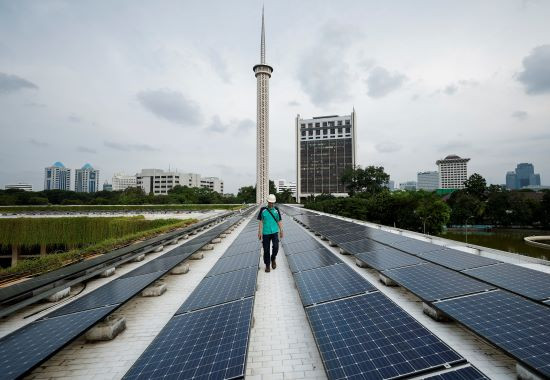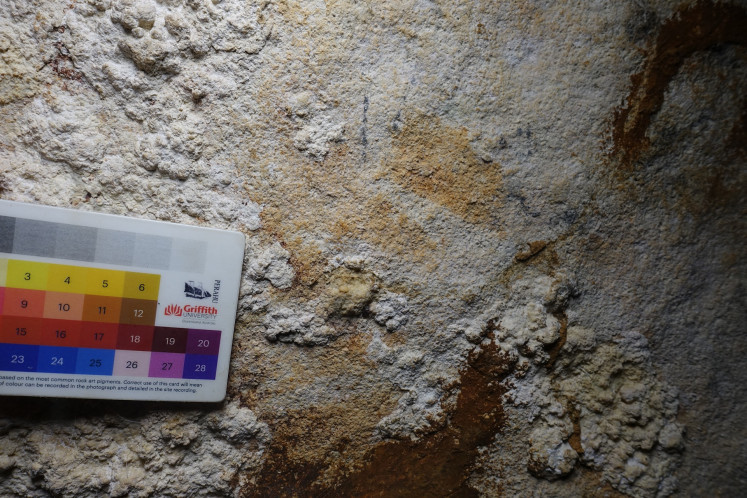Popular Reads
Top Results
Can't find what you're looking for?
View all search resultsPopular Reads
Top Results
Can't find what you're looking for?
View all search resultsHow Islamic finance can drive energy transition
Green and sustainable sukuk can drive significant capital into large-scale carbon reduction projects and other crucial sustainability efforts.
Change text size
Gift Premium Articles
to Anyone
I
n his speech on the 2026 draft state budget (RAPBN), President Prabowo Subianto pledged to accelerate the energy transition process, achieving 100 percent renewable energy in just a decade.
However, considering the details outlined in the National Electricity Supply Plan (RUPTL) for the next 10 years, the President’s statement can be seen as an empty promise. The recently issued RUPTL 2025-2034 still includes a significant share of fossil fuels, particularly coal and gas.
Meanwhile, the proposed Rp 404 trillion (US$25 billion) energy subsidies still leave a critical gap: The President did not specify which energy sources will benefit, leaving funding for the energy transition a major question.
To close this gap, the government should begin exploring blended-finance mechanisms. One promising avenue is Islamic finance, which holds enormous untapped potential—including the use of zakat funds to support energy transition.
The National Zakat Agency (BAZNAS) has found zakat revenue has grown 27.5 percent year-on-year (yoy), underscoring its rising capacity. Beyond its sharia compliance, Islamic finance is increasingly recognized on the global stage for its ethical foundation and strong alignment with sustainability. At a time when the world faces mounting environmental and social challenges, Islamic finance offers a powerful model to drive positive change, foster equity and accelerate a just and sustainable future.
Islamic finance offers an ethical framework with a strong alignment to sustainability. This foundation is rooted in Maqasid al-Shariah, the higher objectives of Islamic law, which emphasize preserving faith, life, intellect, progeny and wealth. This provides a holistic approach to human well-being and societal flourishing.
For Islamic financial institutions, this framework presents not only a moral compass but also a unique opportunity to align with universal principles of stewardship (khalifah), balance (mizan) and the imperative to avoid harm (la dharar).
This ethical framework is further reinforced by the concept of Tayyib, a word referenced in 46 verses of the Quran. Tayyib embodies goodness, purity and wholesomeness—not only in financial transactions but also in the nature of goods, services and the broader impact of economic activity.
Unlike principles that simply define what is merely permissible (halal), Tayyib sets a higher standard, prioritizing what is genuinely beneficial and sustainable for all creation. This concept holds immense potential to raise standards of practice and infuse the industry with a renewed sense of responsibility.
Such values find remarkable synergy with the United Nations Sustainable Development Goals (SDGs). This alignment is not coincidental but deeply rooted in shared commitments to social justice, environmental stewardship and equitable development.
A survey conducted by the Global Ethical Finance Initiative (GEFI) at COP28 highlighted this convergence: 96 percent of respondents said Islamic finance products reflect their values and ethics, while 90 percent agreed they are aligned with the SDGs. These figures underscore the strong public perception of Islamic finance as a values-driven industry, capable of delivering financial returns while advancing ethical, sustainable and socially responsible principles.
By embracing Maqasid al-Shariah and the Tayyib concept, Islamic finance can play a transformative role in bridging faith and sustainability, helping to build an economy that serves both people and the planet.
One of the most promising avenues for Islamic finance to contribute to global sustainability is through the issuance of green and sustainable sukuk (Islamic bonds). These instruments are specifically designed to raise capital for environmentally friendly and socially responsible projects.
By channeling investment into initiatives like renewable energy, energy efficiency, green buildings, sustainable transport, wastewater management and waste management, green and sustainable sukuk can drive significant capital into large-scale carbon reduction projects and other crucial sustainability efforts.
Indonesia serves as a compelling case study, having been the world's first sovereign green sukuk issuer since 2018. The country’s program has achieved a cumulative issuance of $6.9 billion by 2022, with its latest achievement being a $1.5 billion issuance with a 4.70 percent coupon rate. Its diverse green project portfolio includes irrigation infrastructure, mangrove restoration, forest waqf, clean drinking water systems and railway infrastructure. Some of these projects alone could save 974,823 tonnes of CO2 annually.
A newly released "Islamic Finance and Renewable Energy" report, a collaboration between Greenpeace MENA, as part of the Ummah For Earth Alliance, and GEFI, highlights the transformative potential of Islamic finance in accelerating the global transition to renewable energy. Findings from the report reveal that by allocating just 5 percent of the Islamic finance sector’s $4.5 trillion in assets to renewable projects, an impressive $400 billion could be unlocked for climate finance.
By embracing the Maqasid al-Shariah and the Tayyib concept, and by leveraging innovative instruments like green and sustainable sukuk, Islamic finance is uniquely positioned to drive higher standards of practice and business. This not only promises renewed dynamism for the industry itself but also offers a powerful and ethical pathway to achieving global sustainability goals and fostering a more prosperous and just world for all.
To truly commit to the energy transition, governments must focus on developing renewable energy and shift Islamic financial investments toward green projects, moving away from fossil-based or other extractive industries.
***
The writer is Ummah for Earth Project leader at Greenpeace Indonesia. The views expressed are personal.











